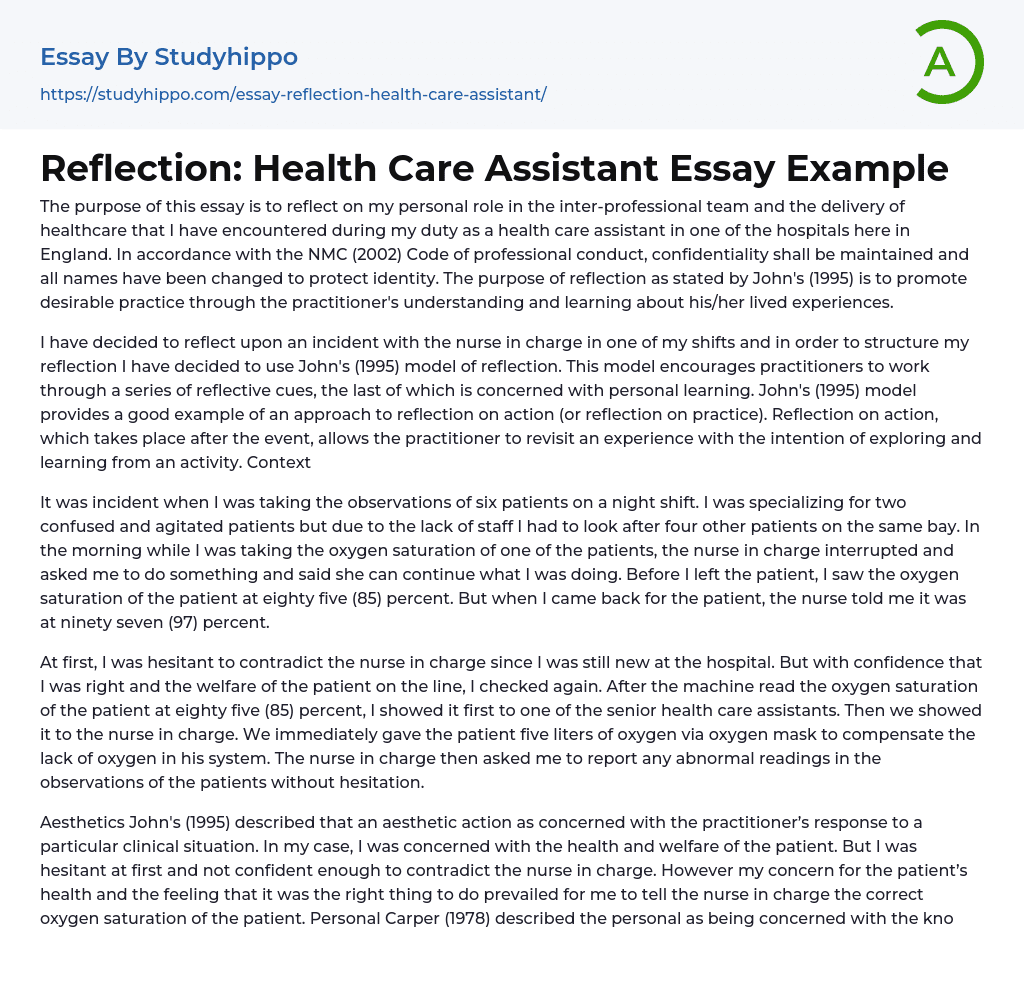The purpose of this essay is to reflect on my personal role in the inter-professional team and the delivery of healthcare that I have encountered during my duty as a health care assistant in one of the hospitals here in England. In accordance with the NMC (2002) Code of professional conduct, confidentiality shall be maintained and all names have been changed to protect identity. The purpose of reflection as stated by John's (1995) is to promote desirable practice through the practitioner's understanding and learning about his/her lived experiences.
I have decided to reflect upon an incident with the nurse in charge in one of my shifts and in order to structure my reflection I have decided to use John's (1995) model of reflection. This model encourages practitioners to work through a series of ref
...lective cues, the last of which is concerned with personal learning. John's (1995) model provides a good example of an approach to reflection on action (or reflection on practice). Reflection on action, which takes place after the event, allows the practitioner to revisit an experience with the intention of exploring and learning from an activity. Context
It was incident when I was taking the observations of six patients on a night shift. I was specializing for two confused and agitated patients but due to the lack of staff I had to look after four other patients on the same bay. In the morning while I was taking the oxygen saturation of one of the patients, the nurse in charge interrupted and asked me to do something and said she can continue what I was doing. Before I left the patient, I saw the oxygen
saturation of the patient at eighty five (85) percent. But when I came back for the patient, the nurse told me it was at ninety seven (97) percent.
At first, I was hesitant to contradict the nurse in charge since I was still new at the hospital. But with confidence that I was right and the welfare of the patient on the line, I checked again. After the machine read the oxygen saturation of the patient at eighty five (85) percent, I showed it first to one of the senior health care assistants. Then we showed it to the nurse in charge. We immediately gave the patient five liters of oxygen via oxygen mask to compensate the lack of oxygen in his system. The nurse in charge then asked me to report any abnormal readings in the observations of the patients without hesitation.
Aesthetics John's (1995) described that an aesthetic action as concerned with the practitioner’s response to a particular clinical situation. In my case, I was concerned with the health and welfare of the patient. But I was hesitant at first and not confident enough to contradict the nurse in charge. However my concern for the patient’s health and the feeling that it was the right thing to do prevailed for me to tell the nurse in charge the correct oxygen saturation of the patient. Personal Carper (1978) described the personal as being concerned with the knowing, encountering and actualization of the individual self.
My personal response was that I was grateful to have worked with a senior health care assistant and a nurse in charge who work brilliantly to deliver the highest quality of care. I
felt more confident that I can do my duties well as part of the health care team. Ethics John's (1995) referred to ethics as knowing what is right and wrong and being committed to act on this basis. It is upon my reflection that if you are right, no hesitation should prevent you from doing the right thing. Empirics John's (1995) stated that empirical knowledge is for describing, explaining and predicting phenomena of special concern to the discipline of nursing.
Upon my reflection, I should not have hesitated to report the incident as it concerned primarily the patient’s life or death. Reflexivity Reflexivity is the final stage of John's (1995) model, which enables practitioner’s to identify, confront and resolve contraindications between their aims and actual practice, with the intent to achieve more desirable and effective work. On the whole, I found this as a valuable learning experience. In order to become an effective part of the health care delivery system, I need to be more confident in doing my duties and responsibilities as a health care assistant.
- Values of Life essays
- Ethical dilemma essays
- Normative Ethics essays
- Virtue Ethics essays
- Belief essays
- Deontology essays
- Moral essays
- Virtue essays
- Work Ethic essays
- Hospital essays
- Physician essays
- Health Care Provider essays
- Universal Health Care essays
- Readmission essays
- Psychometrics essays
- Measure essays
- Why I Want to Be a Nurse essays
- Nursing Profession essays
- Why Did You Choose Nursing essays
- Acceptance essays
- Age Of Enlightenment essays
- Child Observation essays
- Confucianism essays
- Conscience essays
- Critical Reflection essays
- Destiny essays
- Determinism essays
- Empiricism essays
- Environmentalism essays
- Epistemology essays
- Ethics essays
- Ethos essays
- Existence essays
- Existentialism essays
- Fate essays
- Free Will essays
- Functionalism essays
- Future essays
- Good And Evil essays
- Human Nature essays
- Individualism essays
- Meaning Of Life essays
- Metaphysics essays
- Natural Law essays
- Personal Philosophy essays
- Philosophers essays
- Philosophy Of Life essays
- Political Philosophy essays
- Pragmatism essays
- Reality essays




